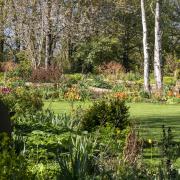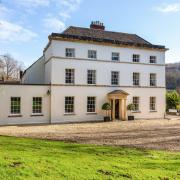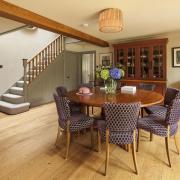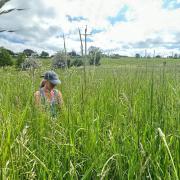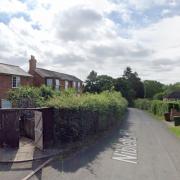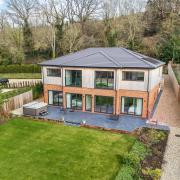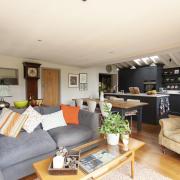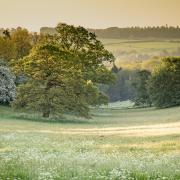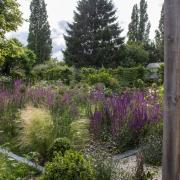How do we ensure our rural communities thrive? How do we help make the Cotswolds diverse in a way that’s sustainable? In 1923, Gloucestershire Rural Community Council began tackling those issues – and it’s still giving vital support today. Katie Jarvis speaks to CEO Barbara Piranty
Here is a portrait of England.
Ravaged by a pandemic that has killed unthinkable numbers; huge national debt; a cost-of-living crisis; poverty; poor housing; sick of hearing about war… (Need I go on?)
And the community cohesion that once bound villages tightly together is a fast-disappearing asset at a time of great need.
But this is not the England of 2023.
This is 100 years earlier.
In Painswick House – home to the magnificent Rococo Garden – three people are meeting. Sir Francis Hyett, the owner, who was born in this glorious limestone mansion, is the former chairman of Gloucestershire County Council, not to mention co-founder of Marling, Stroud’s boys’ grammar: an old Etonian and Cambridge man to boot.

Round the table with this kindly-looking individual (moustachioed and bespectacled), is Grace Hadow, a suffragist, musician, and founder member of the Women’s Institute. (It was she who introduced Jerusalem – previously a suffrage anthem – to the organisation, recognising the WI as a body to empower women.)
Our third member is Constance Cripps, born in Barnsley, Cirencester; wife of Sir Frederick Cripps, current vice-chairman of the county council. Important in her own right, Constance is another woman determined to strengthen and spread the WI movement.
Grace has already been instrumental in setting up the first Rural Community Council, over the border in Oxfordshire where she lives. The remit of these organisations is to bring villages together; to introduce activities that foster bonds between neighbours; to allow English country settlements to thrive and prosper once again.

Now the three of them – Francis, Grace and Constance - are in the process of establishing Gloucestershire Rural Community Council (GRCC), which will become the third oldest in the country.
They will invite bodies that represent every aspect of the rural community to the inaugural meeting. Among them, the Gloucestershire Federation of Women’s Institutes (of course); the National Farmers’ Union; the Workers’ Educational Association; representatives of the county’s teachers and nurses.
They are trailblazers all in terms of education – health and academic – with an understanding that power comes from building strong and sustainable rural settlements. This, along with helping to alleviate the brutal poverty in the English countryside, is their aim, including setting up more than 120 home-food production clubs and 20 pig clubs.
Outside these walls is a country ravaged by Spanish Flu, the 1914-18 war, and a devastating economic crisis.

With community cohesion, GRCC believes, you can face almost anything.
‘WHERE DO YOU THINK the highest proportion of social housing is across the four rural districts of Gloucestershire?’ Barbara Piranty challenges me.
Umm. Good question. ‘The Forest of Dean?’ I hazard.
She shakes her head. ‘Cotswold.’
Really? Cotswold?
The point she’s making is an apposite one. Because the Cotswolds, to outsiders – ‘And some insiders,’ she points out – means celebrities; it means royalty. It’s the place where your estate wasn’t built by Bovis but by your ancestors back in the 16th century.
‘There’s a perception that it’s super-rich and super-affluent; that there is no deprivation anywhere.’
Does it matter people think that?
‘It does when it comes to funding – whether from government or big lottery or wherever. There’s a sense that Gloucestershire doesn’t need it because we’re doing very well, thank you.’

Barbara heads up today’s GRCC – CEO, if you want the correct term – with the same fervour of those founders of 100 years ago. Ask her, and she’ll tell you the needs of Gloucestershire’s rural communities have changed surprisingly little over that century. Nor have the priorities of Rural Community Councils.
Poverty is everywhere in the county (in the country!) - of course it is.
And GRCC is working with people throughout Gloucestershire, in urban and rural settings. But the organisation is also keen to point out anomalies; to challenge assumptions.
Such as the idea that the sheer beauty of the Cotswolds is an advantage to everyone.
Well, yes – and no.
While access to nature and gorgeous views is good for mental well-being, the disparate nature of small settlements (charming to those with means) isn’t quite so appealing when there’s little public transport.
And as to chocolate-box cottages (or, indeed, any property)…
‘The average cost of housing is now four to six times your average income [in the Cotswolds] so you have already, before you start, the difficulty in maintaining any kind of sustainability in a community.’
In other words: no shop, no school, no post office, and no reliable means of getting to any.
Let’s drill down a little more.

According to HM Land Registry, properties in the region sold for an average of £414,667 in 2022 – way above the UK average of £289,818.
Go for a detached property, and you’re up into the giddy £600,000-plus category.
In January 2023 alone, property prices in the area rose by an average of £5,000.
Now take somewhere such as gorgeous Bourton-on-the-Hill (traditional houses cascading down a street with fabulous views), nicknamed the Cotswolds’ ‘poshest’ village. Here, you’ll pay a whopping average of £800,000.
Yet despite their beauty, these villages need a range of different people to thrive and survive – all ages; families; agricultural workers; teachers; GPs; the caring professionals. And they need people whose families have always lived there, who retain a knowledge that gives a sense of place, a sense of heritage, a pathway to the past and the future.
‘We know that significant numbers of property in the Cotswolds are second homes owned by those seeking the slower pace of the countryside,’ Barbara says. ‘But these people are not just buying up larger properties now; they’re buying medium-sized property and expanding it. So, suddenly, you find yourself in a community that’s struggling to sustain itself because you just don’t have the right demographics or housing stock to make it work.’
If anything, the rental market is even more alarming. Google ‘rentals in Cirencester’ and you’ll find the cheapest currently on one prime site is a one-bed flat at £800pcm.
With the average salary for Gloucestershire around £36,000, you don’t need advanced maths to work out the grimness of that particular sum.
And we’re talking here about people with jobs…
Even the figures relied on to signpost need in small areas – gathered by the IMD (Indices of Multiple Deprivation) – don’t really work for the Cotswolds: calculated, as they are, on critical mass, they can fail to highlight deprivation in places with a population that’s more spread out.
Barbara nods.
‘You should not be disadvantaged because of where you live.’
SO, THERE ARE SOME of Gloucestershire’s problems writ large.
What are the solutions?
Now we’re talking.
In 1923, GRCC was all about village activities – encouraging drama (lending out equipment); putting villages in touch with each other so they could share ideas and solutions; setting up educational opportunities.
And today’s GRCC isn’t all that different – albeit somewhat more ‘sophisticated’ in its methods.
Supporting town and parish councils; creating a village and community hall network; providing training to the voluntary sector.

Digital connectivity is a big part.
One thank-you email reads:
GRCC has made learning iPad skills fun and easy. Just by sitting at my side and showing me the basics, Matthew has encouraged me and this in turn has made me want to learn more and more. Thank you GRCC, you got me started.
(Who knows the story behind that heartfelt testimonial… Certainly, for many lonely rurally-based people, that sort of tuition has been a literal life-saver.)
It’s also about rescuing people in danger of falling down cracks in the system. GRCC employs some 50 people, from affordable housing specialists to flood and community resilience officers. Others help those even now feeling the effects of Covid – a loss of confidence that hasn’t gone away; a carer who still feels their loved one is vulnerable; people with serious mental health issues.
Solutions are often innovative.
One army veteran, who could hardly leave her home after suffering PTSD, is being helped by specialist pet-therapy dogs. Every day, she’s venturing a little further afield with her canine companion and supporter.
At a different end of the spectrum was an elderly gentleman, living in a beautiful house in an idyllic Cotswold location. Yet – possibly because of misleading perceptions; maybe because of the ‘emptiness’ of the village during the week – he had slipped under the radar.
‘A [GRCC employee] found he was living in just one room. That room was immaculate but the rest of the house was falling down around his ears. He didn’t know how he was going to cope but was too proud to ask for help.
‘He was able to have an informal conversation with us; we put the necessary resources his way and reconnected him to his community. It doesn’t matter how many times you tell older people that the ‘authorities’ aren’t going to take you away from your home and put you into residential care, some people still worry. We were able to build confidence and trust, and hope that helped to reduce the shame he was feeling.’
GRCC, in partnership with GAPTC (Gloucestershire Association of Parish & Town Councils) is right behind a move helping to make parish councils more vibrant and diverse.
‘You look at someone like Joe Harris, who became a councillor when he was very young [in 2011, aged 18, he was elected the youngest councillor in the UK; today he is leader of Cotswold District Council and a county councillor.] It’s about: How do you encourage younger people to come onto the council?
‘I remember doing a talk in Blockley where somebody asked me, ‘What makes a sustainable community?’
‘And I said, it’s about inclusion – reaching the people at the outer edges; and understanding that not everyone wants to or can engage in the same way. Not everyone wants to join a club. Not everyone wants to be part of the village hall committee. It doesn’t mean they don’t have a valuable contribution or a view that should be heard.’
So let’s give Barbara another job. A hypothetical one (perhaps sadly). But, if she were PM?
Easy.
‘Affordable housing is the key to sustainable communities. It has to be about making sure people can stay and work in a village and in suitable property. People who can do jobs of every description – that whole demographic in the community they grew up in.
‘As it stands, many key workers cannot afford to live where they work, which causes recruitment and retention issues across sectors, including health and education. Couple that with an ageing population, and sustainability becomes impossible to achieve.’
• For more on GRCC, visit grcc.org.uk




